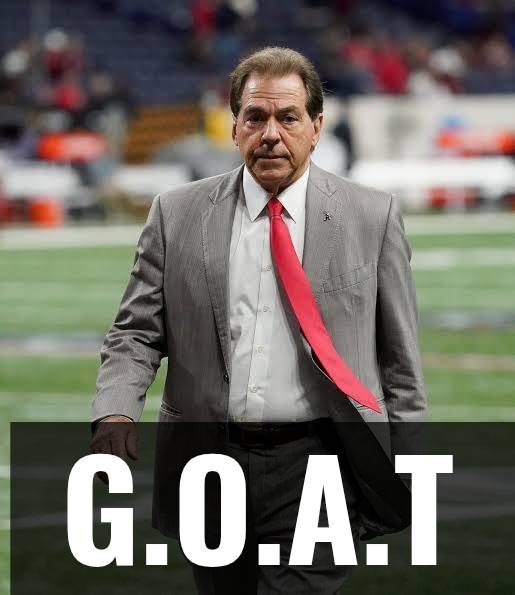In a definitive move that cements a legacy already considered unshakable, ESPN has officially declared Nick Saban the greatest college football coach of all time, surpassing even the most legendary names in the sport’s storied history. For fans of college football, and particularly for the Alabama Crimson Tide faithful, the news reverberates like the final whistle of a national championship victory—undeniable, triumphant, and thoroughly earned.
This distinction comes not just from an emotional reverence but from hard data, coaching longevity, championships, cultural impact, and, perhaps most notably, the transformation of Alabama into a modern college football dynasty under Saban’s reign. Though other names like Bear Bryant, Joe Paterno, Tom Osborne, Urban Meyer, and Bobby Bowden will forever be revered, ESPN’s evaluation leaves little room for doubt: Nick Saban has redefined greatness in college football.
The Man Behind the Dynasty
Nick Saban, born October 31, 1951, in Fairmont, West Virginia, took a winding but determined path to the pinnacle of college football. After coaching stints in the NFL and at programs like Michigan State and LSU (where he won a national title in 2003), Saban arrived in Tuscaloosa in 2007 amid skepticism, hype, and pressure. What followed was a paradigm shift not just for Alabama, but for the entire college football landscape.
From 2009 to 2020, Saban’s Crimson Tide teams won six national championships (2009, 2011, 2012, 2015, 2017, 2020), tied for the most all-time by a single coach in the AP Poll era and surpassing even Paul “Bear” Bryant, the man many thought could never be dethroned in Tuscaloosa. When factoring in his 2003 title with LSU, Saban owns seven national titles, the most by any coach in the modern era.
The Resume That Rewrote the Record Books
What makes Saban’s reign stand out isn’t just the number of wins—though he has plenty, retiring with a career record of 292–71–1—but the consistency of excellence. Consider the following:
- 14 consecutive top-10 finishes in the final AP Poll at Alabama.
- 10 SEC titles, with dominance over one of the toughest conferences in football.
- Produced multiple Heisman Trophy winners under his guidance, including Mark Ingram (2009), Derrick Henry (2015), DeVonta Smith (2020), and Bryce Young (2021).
- An unmatched NFL Draft pipeline: more than 40 first-round picks coached during his time at Alabama.
- A coaching tree that includes current and future head coaches at powerhouse programs—his influence extends across the sport.
ESPN’s panel, comprised of historians, analysts, former coaches, and players, assessed Saban’s achievements in terms of competitive dominance, program-building, player development, adaptability to the modern game (including NIL and transfer portal), and cultural impact.
Surpassing Bear Bryant
To be declared the GOAT at Alabama, one must reckon with Bear Bryant. For decades, Bryant’s shadow loomed over every Crimson Tide coach. With six national titles and 13 SEC titles over 25 seasons, Bryant was the standard.
But what makes Saban’s accomplishment more staggering is the era in which he achieved it. Modern college football includes a playoff system, intense media scrutiny, scholarship limitations, early player declarations for the NFL, and a volatile transfer portal. Saban thrived in this chaos.
Where Bryant was the symbol of old-school dominance, Saban became the architect of modern dynasty building. He adapted at every turn—from leaning on stout defenses to engineering explosive offenses under coordinators like Lane Kiffin, Steve Sarkisian, and Bill O’Brien.
In short, Saban didn’t just win. He evolved, and that’s what ultimately pushed him past Bryant in ESPN’s eyes.
Player Development and the NFL Factory
A key element in Saban’s GOAT status lies in his unmatched player development system. Alabama became an NFL pipeline under his stewardship, and Saban’s methods resonated beyond Tuscaloosa.
In the 2011 NFL Draft alone, Alabama had four first-round picks. In 2021, they had six first-rounders. From Julio Jones to Minkah Fitzpatrick, from Quinnen Williams to Tua Tagovailoa and Jaylen Waddle, the Crimson Tide sent a steady stream of pro-ready athletes to the NFL, all of whom lauded Saban’s discipline, preparation, and standards.
NFL coaches repeatedly praised the “Saban Factor”—players arriving ready-made, prepared for the rigors of professional football. This reputation helped with recruiting and cemented Saban as the ultimate developer of talent, further validating ESPN’s crowning of him.
Cultural and Programmatic Transformation
Saban didn’t just win games—he reshaped Alabama football’s entire infrastructure. From a once-proud but faltering program in the early 2000s, Saban ushered in a professionalization of college athletics rarely seen before. He demanded investment in facilities, nutrition, academic support, and mental health—all areas where Alabama now leads.
His “Process” became legendary. More than a slogan, the Process was a system of relentless attention to detail, individual accountability, and total team commitment. It is now widely studied across sports organizations and corporate leadership groups.
Saban changed the culture of expectation. Alabama no longer hoped to win—it expected to dominate.
The Final Seasons and Lasting Legacy
Even in his final seasons, Saban remained elite. His 2023 team, considered by some a rebuilding year, made the College Football Playoff. In 2021, he led Alabama to the national title game and produced the Heisman-winning quarterback in Bryce Young.
His final season in 2024 saw him retire on his terms, with Alabama remaining a top-five program and still feared across the country. Saban didn’t fade away—he left the sport still sharp, still relevant, and still elite.
Upon his retirement, Saban seamlessly transitioned into a prominent broadcasting role with ESPN, where his sharp football mind and straight-shooting personality have already earned praise.
Reaction Across the College Football World
Reaction to ESPN’s ranking has been overwhelming in its support. Former players, rival coaches, analysts, and even critics acknowledged the correctness of the call.
Kirk Herbstreit called Saban “the most influential figure college football has ever had.”
Paul Finebaum, often one of Saban’s harshest critics during his tenure, said: “This was never in doubt. Bear Bryant was great. But Saban took it to another level.”
Urban Meyer, himself a three-time national champion, called Saban “the best to ever do it.”
Jimbo Fisher, a former assistant and longtime SEC rival, commented: “You may not like him, but if you want to beat him, you better be perfect. That’s the standard he created.”
A Legacy Carved in Stone
Saban’s crowning as the greatest of all time by ESPN isn’t just about rings, wins, or Heisman trophies. It’s about impact. It’s about the transformation of an entire program, an entire conference, and, in many ways, the entire sport of college football.
His methods are studied. His system is emulated. His coaching tree is sprawling. His program is the blueprint.
He is college football’s Vince Lombardi. Its Bill Belichick. Its Phil Jackson.
More than a coach, Nick Saban became a living institution, and now, with ESPN’s declaration, he takes his rightful place atop the mountain of college football immortality.
Looking Forward: Saban’s Enduring Influence
Though he’s retired from coaching, Saban’s influence remains strong. His disciples are everywhere—from Kirby Smart at Georgia to Steve Sarkisian at Texas. The “Saban DNA” is ingrained in many of today’s elite programs.
With his role as a broadcaster and analyst, his voice continues to shape the game. And for Alabama, the house he built will stand for generations.
Facilities, culture, expectations—all bear his imprint.
And for young players, the dream remains the same: to don the crimson and white, and to live up to the standard set by the greatest coach of all time.
Final Word
Nick Saban wasn’t just a coach; he was a revolution. He took Alabama from good to generational, and college football from regional pride to national obsession.
With seven national championships, dozens of NFL stars, and an unrivaled standard of excellence, ESPN’s declaration is not just a coronation—it’s an acknowledgment of a truth we’ve all witnessed over the past two decades.



